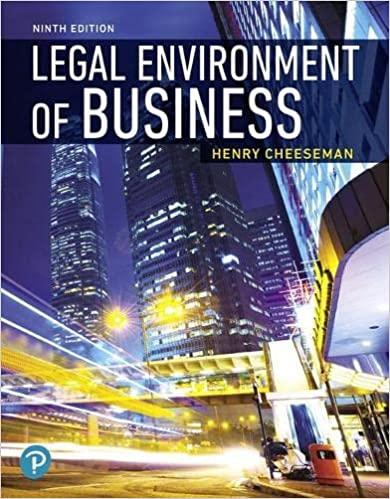Question
True/False: 1. Constitutional law includes only the U.S. Constitution. 2. A federal law that conflicts with the U.S. Constitution will be deemed unconstitutional. 3. A
True/False:
1. Constitutional law includes only the U.S. Constitution.
2. A federal law that conflicts with the U.S. Constitution will be deemed unconstitutional.
3. A state law that conflicts with the U.S. Constitution will be deemed unconstitutional.
4. The U.S. Constitution is the supreme law of the United States.
5. A state court system is typically made up of trial courts, appellate courts, and federal district courts.
6. The jurisdiction of state courts of appeals is substantially limited to hearing appeals.
7. The federal equivalent of a state trial court is a U.S. court of appeals.
8. A promise to pay in exchange for a promise of performance becomes an absolute duty when the agreement is formed.
9. The performance due in a contract may be conditioned on the occurrence or nonoccurrence of a specific event.
10. A party normally satisfies its duties under a contract by actual performance.
11. Complete performance occurs when conditions in a contract fully occur in all aspects.
12. A contract is substantially performed when performance creates substantially the same benefits as those promised in the contract.
13. Subjective impossibility discharges a contract.
14. Foreseeable bad weather conditions can excuse a party from performing a contract on the ground of commercial impracticability.
15. A breach of contract entitles the innocent party to sue for damages.
16. Damages are designed to compensate a nonbreaching party for the loss of the bargain.
17. An arbitrary use of ordinary words may be trademarked.
18. A suggestive use of ordinary words may be trademarked.
19. A personal name is protected under trademark law unless it acquires a secondary meaning.
20. A generic term is not protected under trademark law unless it acquires a secondary meaning.
21. Trade dress has the same legal protection as trademarks.
22. Intentionally taking and distributing pirated, copyrighted works to others is a crime.
23. A copy must be exactly the same as the original to constitute copyright infringement.
24. It is not possible to copyright an idea.
25. Trade secrets include anything that makes an individual company unique and would have value to a competitor.
Step by Step Solution
There are 3 Steps involved in it
Step: 1

Get Instant Access to Expert-Tailored Solutions
See step-by-step solutions with expert insights and AI powered tools for academic success
Step: 2

Step: 3

Ace Your Homework with AI
Get the answers you need in no time with our AI-driven, step-by-step assistance
Get Started


